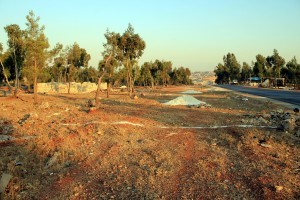Syrian Opposition Struggles To Police Kfar Nabel

Security forces say they lack manpower and resources to properly investigate crimes.
By Hazzaa Adnan al-Hazzaa
In December last year, Fadel al-Akel went to the opposition forces’ police headquarters in Kfar Nabel to report the theft of his motorcycle, worth around 500 US dollars, which had been stolen from his back yard the previous night.
Akel, 31, who works for the Unified Aid Bureaus relief organisation, described the Kfar Nabel police as the nucleus of a force that would be established after the fall of the Assad regime.

But he said that while the local police acted professionally, he had not been completely satisfied with their performance.
“They filed a complaint against an anonymous offender and asked me to give them a description of the motorcycle. They promised that they would investigate the matter, but nothing has been done so far,” Akel said with clear disappointment.
Kfar Nabel, with a population of about 30,000, has been outside government control since August 2012. It is currently controlled by two armed groups, the Fursan al-Haq Brigade, which is part of the Free Syrian Army (FSA) and the Suqur al-Sham Brigade, an affiliate of the Islamic Front.
Two law enforcement groups, the Kfar Nabel police and the Security Battalion, have also appeared. Their leaders say they protect Kfar Nabel from the inside, while Fursan al-Haq has set up checkpoints to protect the entrances to the town.
The Kfar Nabel police was formed in September 2013 by 60 police officers who defected from government forces in 2011. The Security Battalion was set up in early 2013 by 50 opposition fighters, although their numbers have now dwindled to 20.
Both security forces say they are affiliated with Kfar Nabel’s local council, which works with the opposition-led Syrian National Coalition, but they are adamant that they are independent of one another and refuse to merge.
A complaint filed to one force is not shared with the other, something Akel discovered during his quest to retrieve his motorcycle.
The chief of the Kfar Nabel police, Osama al-Hammoud, who holds a law degree, and the chief of the Security Battalion, Maher al-Alio, say that their main problem is lack of equipment.
Both say their respective forces are equipped with Kalashnikov rifles and have one police car each, whereas the criminals they face have larger-calibre machine guns and rocket-propelled grenade launchers.
“We need at least two more cars and medium-calibre weapons. We also need 50 members,” said Alio.
The two chiefs said that over the last six months, their subordinates had only been paid twice, with monthly wages that in any case barely came to 100 dollars.
Local council finance officer Nazih al-Baioush told Damascus Bureau that there were insufficient funds available to cover the security forces’ wages.
Despite these obstacles, the two security forces have been able to arrest over 50 people suspected of murder and theft in the past six months, according to records the security chiefs showed Damascus Bureau.
There is no written code to divide responsibilities among the two structures, apparatuses, but Hammoud said that “we often leave [dangerous] criminals to the Security Battalion while we do other police work such as organising patrols, regulating traffic and recording residents’ complaints”.
“My battalion loves arresting perpetrators, especially those who belong to rebel groups, because they have defamed the uprising,” added Alio.
He also noted that his force had arrested an armed gang that was chopping down trees in wooded areas surrounding Kfar Nabel, and prevented at least ten people from building in these forests.
Both security forces act according to the Syrian penal code, but they hand over the people they arrest to Islamic sharia courts in Kfar Nabel and other nearby towns, which rarely recognise laws devised by the Syrian state. (See also Syria: Sharia Courts Impose Justice in Rebel-Held Idlib http://iwpr.net/report-news/syria-sharia-courts-impose-justice-rebel-held-idlib).
In October 2013, when his police force arrested a man accused of committing murder, Hammoud acted according to official Syrian law and handed over the suspect to the Sharia court in Kfar Zeitna, 35 kilometres south of Kfar Nabel, because that was where the crime allegedly took place.
“Our role ends when the perpetrator goes to court. We do not interfere in the judicial process or in the law applied during his trial,” said Hammoud.
At the entrances to Kfar Nabel, security lies in the hands of around 200 fighters from the Fursan al-Haq Brigade, who guard six checkpoints and are paid some 100 dollars a month from the brigade’s treasury, according to its leader Fares al-Baioush.
Fighters at these checkpoints carry the kind of medium-calibre machine guns that the Kfar Nabel police and the Security Battalion say they aspire to.
Baioush said Fursan al-Haq had been able to stop several kidnappings thanks to its checkpoints.
Some people, however, have voiced scepticism about the real aim of these security posts, saying they only seek to protect Fursan al-Haq against kidnappings or car-bomb attacks carried out by the Islamic State of Iraq and Syria (ISIS).
In response, Baioush said, “The checkpoints are there to protect all of Kfar Nabel from ISIS and others.”
Despite these initiatives to protect Kfar Nabel, Akel now brings his new, replacement motorcycle inside his house each night rather than leaving it in his backyard.
Nor does he not feel safe enough to come home after dark.
“I’m scared of being kidnapped or hit by a stray bullet,” he said.
